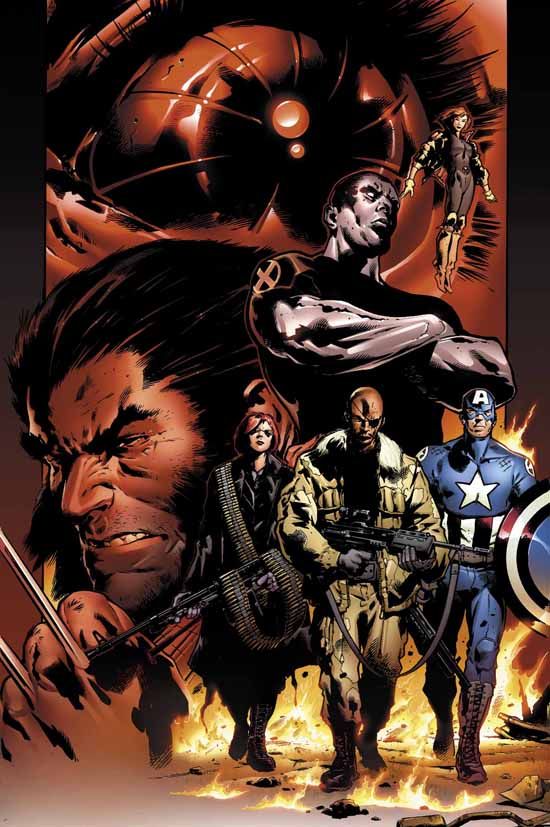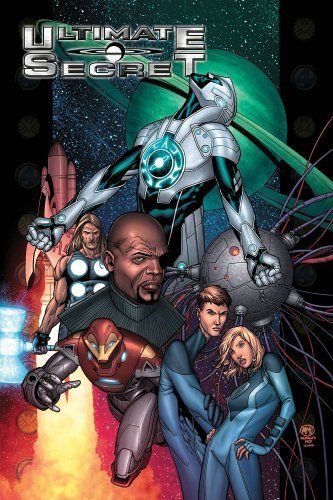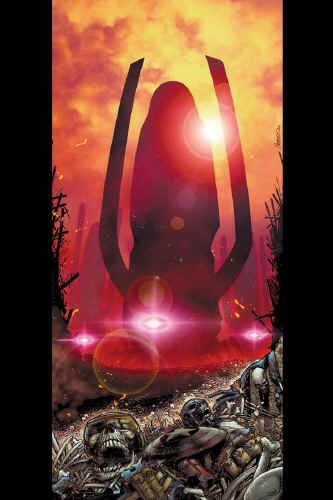And we come to the end of August, which has turned into Ultimate month here at the reread reviews. That wasn't done on purpose, but once I'd done three weeks of Mark Millar Ultimate stuff, I figured why not finish it with two weeks of Warren Ellis? After all, I like Ellis's work more -- and it's discussed/remembered/read less. So I will educated you all! Oh yes. And to conclude things, we get an odd one. Spoilers as always.
The Ultimate Galactus Trilogy is written by Warren Ellis and made up of three different series with five artists: Ultimate Nightmare with Trevor Hairsine and Steve Epting; Ultimate Secret with Steve McNiven and Tom Raney; and Ultimate Extinction with Brandon Peterson. You can buy the whole thing in a variety of formats: single issues, individual series trades, deluxe hardcover collecting all three and a paperback version of the hardcover. I have the trades for all three series having gotten them cheap at the University of Windsor's bookstore last September -- they had a huge stockpile of Marvel trades for very, very cheap rates (that's where I got Millar's Ultimate X-Men run). The same day that I purchased these three books, I also got Iron Man: Extremis, which is a frustrating, brilliant read for many reasons. Maybe someday, I'll return to it. Until then, we have these three books.
It's hard to take them as a whole since, while they tell one big story, they each have their own plots and casts and art teams. Ultimate Nightmare was actually the only part of the story that Ellis was scheduled to write, it acting as a lead-in to a big Ultimate crossover by Mark Millar, but health problems meant that he had to back out and Ellis was put in the position of completing the story. As such, Ultimate Nightmare is the best of the trilogy, playing to Ellis's strengths more so than the other two. Ultimate Nightmare is the black ops, history coming back to fuck us, horror-ish story with a team from the Ultimates attempting to discover the source of these nightmarish transmissions that have been broadcasts worldwide. Meanwhile, Professor X sends some X-Men to rescue a mutant psychic who's been sending out similar thoughts... this pays off at the end when Nick Fury and company basically call the X-Men morons for not even bothering to turn on a TV at any point to see if maybe something bigger was going on. It's an interesting critique of Xavier and his group -- so self-focused, so isolated that they don't really fit into the world... and, if they don't, are they actually relevent? How can they bridge the gap between humans and mutants if they're so disconnected from the society they live in? A small moment that leads to a larger unspoken critique of the group and its mission/tactics.
Ultimate Nightmare deals with an area of Russia called Tunguska, which had something crash in it from space 100 years ago. Now, nightmarish transmissions regarding the deaths of various alien civilisations are interrupting broadcasts around the world, speaking of death and no hope, leading to suicides and such. Fury puts together a small team to investigate made up of himself, Captain America, the Black Widow, and Sam Wilson -- making his first Ultimate appearance. Wilson here has his Falcon wings, is former military, is a science guy, and isn't yet best buds with Steve Rogers. The group of X-Men sent are Jean Grey, Wolverine, and Colossus. Both teams discover that the Soviet base where the transmissions/psychic screams are coming from houses monsters... the remnants of one of the failed attempts to create Soviet super-soldiers. Weird freaks full of alien machinery, most gone mad... culminating eventually in Captain America's opposite number, Captain USSR... a man whose red uniform is a duplicate of the WWII uniform Cap had, but they couldn't duplicate Cap's shield, so he made his own -- out of human bone and flesh.
Ellis uses Captain USSR to highlight some points about Captain America here: while the USSR psycho goes on and on about honour, glory, and pride, Cap responds that fighting isn't about any of those things. No, fighting is about winning... at which point he uses a bone fragment to kill the Soviet. This isn't a 'cool' scene to me, but it is a revealing one as Ellis really sums up the difference between Ultimate Captain America and his regular MU counterpart. The MU Cap is about honour, glory, and pride... he represents an ideal, the soldier who somehow wins wars without slaughtering his opponent... he's the nice soldier that kicks ass for country, but doesn't make it messy for us. Ultimate Captain America is a guy who's been to war and doesn't deny what it is. He doesn't put on a show for everyone or act like what he does isn't about making sure the 'bad guys' don't walk away no matter what. I find that Ellis gets that point across better than Millar does without turning Cap into a complete asshole. Sure, that's there a bit -- like his sneer when Sam Wilson explains that he thought he could do more good outside of the armed forces. There's a great scene in Ultimate Extinction where Fury and Rogers talk, and Rogers explains that the threat they're fighting is too big for him -- it's bigger than anything he's ever encountered and how that relates to his belief in God, and, man, Ellis nails the character there, bringing him back to Earth in a big way. He gets across something that Millar tried to shove down our throats but never really accomplished: the reason why he's such a violent asshole is because fighting is the only thing that's stayed the same. Everything else around him has changed, except for the military and that someone needs their ass kicked. Fighting is the only place that feels like home to him at this point. It wasn't until I read this trilogy that that point really hit me in a big way even though I can tell Millar was going for that.
Ultimate Nightmare ends with the discovery of the Vision, an artificial life sent to warn us one hundred years in advance of the coming of Gah Lak Tus, something beyond comprehension that is going to kill all life on Earth. The Vision has spent its 100 years on Earth begin pulled apart by Soviet scientists, constantly trying to heal itself -- it came to give humanity time to prepare and leave the planet. But, Gah Lak Tus is on the way, so it's too late. Oops.
Ultimate Secret has a bit more energy than the first mini, if only because Ellis had to throw it together in a greater hurry (from what I've read) and with less planning. He updates a couple more characters here, Carol Danvers and Captain Mahr Vehl. This series is actually very typical -- to the point of being boring. The alien sent to Earth that betrays its people, the xenophobic alien race, the asshole humans... if you've read Ellis before, this won't surprise you much, honestly. That doesn't mean that it's not good, it's just that it doesn't necessarily grab you right away.
Normally, I'm the first one to say that energy in storytelling beats everything else (well, not everything else, but energy goes a long way) -- this time, it doesn't. This is actually the part of the story that you could just lift out and you wouldn't be missing a lot. You would miss a couple of details on Gah Lak Tus that are repeated in Ultimate Extinction and the introduction of Mahr Vehl... that's about it. It reads, when looking at the whole story, as something that was thrown together. The switch from Steve McNiven to Tom Raney after the second issue doesn't help. Normally, I'm not a big McNiven fan, but his work here is probably the best I've seen from him. It's not quite as refined as his work has become and his people don't look so made out of plastic. They still do a bit, but not too much.
Ellis's tenure on Ultimate Fantastic Four helps this second part a lot since he uses those four characters to great effect, having them interact with the Ultimates. Ben and Johnny are taken under Thor's wing as he declares them warriors and decides that, before the battle, they need beer. Where Ellis shines is the dynamic between Reed and Sue here -- they're treated like a regular couple with all of the stupid cute banter that couples have, but also the other tensions. While they're obviously going to be together, you get the sense that they're not that sort of 'together forever because that's the way it is' couple that they are in the regular MU. Sue rebuffing Iron Man's advances is also a good scene.
Ultimate Extinction is an odd sort of finale to a big story like this, because there's much more emphasis placed on the science guys figuring things out than Big Muscle Men Hitting Things Until They Stop Working as most events like to end. Is The Ultimate Galactus Trilogy an event? It's a crossover for the Ultimate universe, but... an event? It was intended to be an event until Millar dropped out... how sad is it that when Millar writes it, it's an event, but when Ellis writes it, it's just a quality story?
And I do think this final part is a quality story. I know that there's a lot of people who don't like that Gah Lak Tus here isn't a giant in purple pants, but that wouldn't really work in the Ultimate universe. Galactus would be greeted with laughter and mockery and the threat here is meant to be terrifying and so big that it genuinely seems unstoppable. Galactus doesn't seem that way. He's a giant in purple pants with a dumb looking hat. Earth would get eaten because none of the heroes could stop laughing. Now, a hive-like group of creatures that are approximately one hundred thousand miles long that kill all life on Earth in 24 hours? That's big, that's scary, that's unstoppable.
One area where this entire story falls down is that Gah Lak Tus is never as terrifying as it's meant to be. From Ultimate Nightmare on, we're meant to believe that footage of what Gah Lak Tus does can drive a person insane, but that never really comes through. Now, I think that's largely a result of this being a Marvel Comic, so you can't go too heavy with the horror of entire races being driven insane and slaughtering each other. The limitations prevent showing the horror on the scale that it needs to be shown.
The final part of the story combines ground-level action with the larger Gah Lak Tus plot well through Misty Knight, a former cop turned PI after losing an arm in an explosion -- and having it replaced by Tony Stark with a metal thing. She investigates a possible cult to find a man's wife and that's when we meet one of the Silver Surfers (never called that here) -- a silver man with wings. These silver men are part of the Gah Lak Tus onslaught, sent to Earth to soften up humanity psychologically -- get chunks of it prepared to die when the anti-creator comes. Death cults as a means of killing the planet... such a simple, elegant concept. We see another one of them later, this one sent by Gah Lak Tus after Professor X tries to make telepathic contact and Gah Lak Tus recoils in terror and disgust -- this Silver Surfer is sent like a bullet, switching from silver egg to man on a surf board, but the added touch of four sets of teeth makes him more unsettling -- there's no conscious thought here, he's just another aspect of Gah Lak Tus. We've already had Mahr Vehl switch sides... another alien doing so would be a bit much.
Gah Lak Tus destroying organic life because its mere existence offends it is a good concept. The ultimate xenophobe -- it so desires to be left alone that it will kill everything there is. Ultimately, Gah Lak Tus is defeating on two fronts: more telepathic contact to torture it, Xavier and Grey tapping into all of humanity to push across the experiences of living; the other is a weapon that Reed Richards invents that taps into the energy of the multiverse and fires like an energy cannon, destroying 20% of Gah Lak Tus... the two efforts making it too much of a hassle to try and kill Earth.
Unlike the original 'Ultimate Nullifier,' the weapon here is something that Reed struggles to deal with, to accept that it must be created and used. He's not sure if creating a weapon so powerful isn't just as bad as Gah Lak Tus killing the planet. But, he still does it -- he has to. Something I really don't like, though, is that Nick Fury shares the plans for that weapon with other planets by transmitting the information -- so they can defend themselves against Gah Lak Tus. However, wouldn't a weapon that big and powerful possibly be as potent a threat as Gah Lak Tus? Seems like the sort of thing that would come and bite them in the ass.
The Ultimate Galactus Trilogy is a bit uneven because of the way it's told. The middle part is the lightest and most expendable part -- a sort of false second act. The first and third parts are pretty good... the first part especially since that's where Ellis gets to be Ellis the most. The rest of the story is geared to his style and interests -- the manner in which he has Gah Lak Tus attack and soften up Earth is something that's pure Ellis. The art on the books is uniformly good. Hairsine and Epting work very well in the shadows, which is what the first book needs; the second is brighter, which plays to McNiven and Raney's strengths; while the third has Brandon Peterson's best art that I've ever seen from him. He uses an odd shading technique that's a little distracting at times, but he really shows off what he can do.
The story here doesn't leave a lot of room for character work in any big way. A lot of people show up and get small moments, but the story is so big, the events so monumental that there just isn't the space. I also think that Ellis did this story better in the final arc of his Authority run, which did come across as bigger and more epic. There's a feeling of anti-climax at the end of Ultimate Extinction. I think that's a result of Gah Lak Tus being so big that the heroes are useless. Ellis creates other small threats, but it really comes down to Reed inventing something while Xavier thinks at the creature. It's not that exciting and, while a good story, doesn't necessarily make for a great superhero story. It's one of the rare cases, I find, where Ellis just couldn't make a concept work in the genre -- something he's fantastic at.
But, check it out. It's a good read.




